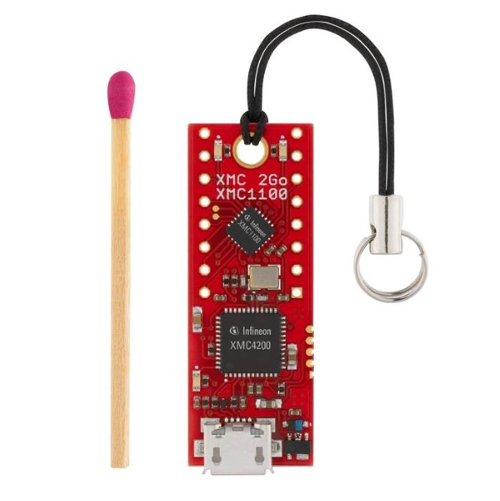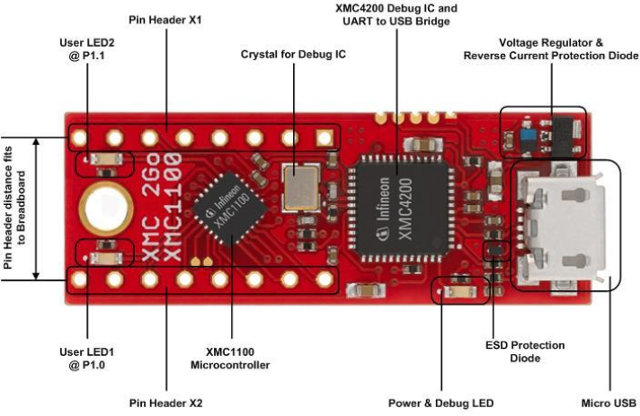Infineon brought another tiny, portable, and cheap ARM Cortex M0 board to market with XMC 2Go development kit featuring XMC1100 ARM Cortex M0 micro-controller with 16KB RAM, 64KB Flash, and tow breadboard friendly headers to access various serial interfaces and ADC pins.
 Key features listed on Infineon website:
Key features listed on Infineon website:
- MCU – Infineon XMC1100 ARM Cortex-M0 MCU @ 32 MHz with 64KB flash, 16KB RAM.
- Debugger – On-board J-Link Lite Debugger using an XMC4200 Microcontroller.
- Headers – 2×8 pin headers suitable for Breadbord with access to 2x USIC (Universal Serial Interface Channel: UART, SPI, I2C, I2S, LIN), 6x 12-bit ADC, external interrupts (via ERU), 4x 16-bit timers
- Misc – 2 x user LED, RTC
- Power – 5V Micro via USB, or 3.3V external power. ESD and reverse current protection
- Dimensions – 14.0 x 38.5 mm
 The board is programmed via USB using the same Dave IDE I tried with XMC4500 Relax Lite Kit. Documentation includes PCB design data, the board’s user manual, and various documents to get started. The board has been released in March, so some people have already played with it (Link in Polish), and another ran some Arduino code on the board (in English!).
The board is programmed via USB using the same Dave IDE I tried with XMC4500 Relax Lite Kit. Documentation includes PCB design data, the board’s user manual, and various documents to get started. The board has been released in March, so some people have already played with it (Link in Polish), and another ran some Arduino code on the board (in English!).
You can find more information and purchase the board on Infineon’s XMC 2Go page. The board is sold for 5 Euros + shipping, but you can also find it on Mouser and Digikey for about $6 to $12.

Jean-Luc started CNX Software in 2010 as a part-time endeavor, before quitting his job as a software engineering manager, and starting to write daily news, and reviews full time later in 2011.
Support CNX Software! Donate via cryptocurrencies, become a Patron on Patreon, or purchase goods on Amazon or Aliexpress. We also use affiliate links in articles to earn commissions if you make a purchase after clicking on those links.





Thx for this hint, I ordered one.
Do you know if there is a linux development availible?
@Dominik
Based on my experience with XMC4500 two years ago, the only tools available are on Windows, so I used a Virtual Machine running Windows at the time.
It makes no sense to keep asking if development for an ARM CPU/MCU is supported on Linux, Windows, or MacOS. Because it is by default – GCC runs on all these systems.
@Paul
You’re right, GCC cross compiler for ARM is, of course, running on Linux (and it appears that the ‘DAVE’ tool provided by Infineon uses GCC).
Still, the C compiler is only part of the story, as you also need tools to download the firmware image on the device, and to debug / trace the execution (not totally required but very useful for any devt)
OpenOCD could probably be used for this purpose on this board, as a J-Link debug interface is provided through the XMC4200.
The problem is that the hardware vendor (Infineon) provides / promotes only Windows based tools, as always, while it could perfectly be possible to use this XMC 2Go kit on any host operating system (maybe with a bit more effort though).